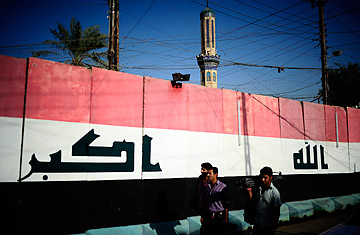
Baghdad, October 2010
Part 16 of TIME's Return to Baghdad series.
While Nate Rawlings went on an overnight embed with his friends in the bomb squad, I looked up some folks I probably couldn't have seen in his company. Throughout the insurgency, TIME was able to maintain good contacts with militants on all sides — Shi'ite, Sunni and, at times, even al-Qaeda. My colleagues and I were able to meet low-level fighters as well as top commanders, spiritual guides and, on one terrifying occasion, a suicide bomber in training.
There were, inevitably, some accusations that we were consorting with murderers and terrorists. But I almost never got criticism from my military sources; they knew better than most the importance of understanding the enemy. Soldiers were curious to know about my encounters and constantly asked me, "What's going on in their heads?"
I imagine Rawlings would want to ask that very question, but these guys are skittish about strangers, so it was best to have the shaku maku (Arabic for "How's it going?") discussion without him.
After 2007, many of my militant contacts came in from the cold. Former Sunni insurgents joined the U.S.-funded Awakening program and began to accept a salary (upwards of $300 a month) from the very soldiers they had been doing their utmost to kill. Some Shi'ite militia contacts were recruited into the Iraqi police and army. A few militants became politicians, and others businessmen. Many simply melted away, never to be heard from again. Inevitably, some were killed.
On this trip, I was able to meet two old contacts, both Sunni, who were reliable sources of information. When I first met them, they were both Saddam Hussein loyalists, motivated by what they called patriotism, not by faith. One remains to this day a die-hard secular Baathist; the other, having fought alongside hardened jihadists of al-Qaeda, gradually morphed into a strident Koran thumper. By 2006, I noticed that during our interviews, he would bookend all his answers with long, obscure (and not always relevant) quotations from the Muslim holy book. I came to think of him as "the Preacher."
The Baathist was absorbed into the Iraqi army from the Awakening program but quickly grew disenchanted. "They took us in but never treated us like soldiers," he told me. "We were marked as bad guys. They treated us either like criminals or like servants." The commander of his unit always addressed him as "Saddami" (Saddamist) and ordered him out of the room whenever the unit was holding important discussions. The final straw, the Baathist said, was when the commander began to pay him only half his salary. "He said the rest of the money was to pay for tea and snacks for the other soldiers, but I know he kept it for himself."
Unsurprisingly, the Baathist deserted. He drifted from job to job before finding a semi-permanent gig as a security guard for a Sunni politician. After some probing by me, he admitted that he is the politician's muscle: his most recent assignment was to beat up a rival pol's cousin, in retaliation for an unspecified slight. But his burning desire, he told me, is to avenge himself for how he was treated by that Iraqi army commander. "One day I will find him in the street alone, and that will be his last day," he said.
The Preacher was never entirely comfortable in the Awakening: taking money from infidel Americans was too much for his newfound religious sensibility. After a few months, he quit, and he's never regretted his decision. "If I had stayed on, I would now be taking orders from some Shi'ite lowlife from Sadr City," he said, with deep contempt. He, too, took a variety of part-time jobs but is now unemployed. He spends most of his time in a mosque in western Baghdad. "Sometimes I see old friends [former comrades from the insurgency] and we talk about the old days," he said. "Nobody is happy with the situation they're in."
I asked both men the question that has been hanging over Baghdad like a storm cloud since Prime Minister Nouri al-Maliki's Shi'ite coalition announced a new alliance with another Shi'ite group: if the Sunnis find themselves shut out of the next government — or simply given some political scraps — will the insurgency reignite? Both said instantly that they would regroup with their old mates and return to the fight.
Neither framed their answer in sectarian terms; instead, they argued (as they had many times before) that it would be their patriotic duty to fight, because the Shi'ite politicians were puppets. Only, the puppet master had changed: it was no longer the U.S. "We all know Iran is controlling this government," said the Preacher. "If the next one is the same, then we may have to do something."
It's easy to dismiss such talk as false bravado or bluffing — there's plenty of both in Baghdad. But I know all too well what the Preacher and the Baathist are capable of. If there are, as they claim, many more who feel the way they do, then we should all be very, very worried about the Iraq the U.S. is leaving behind.
